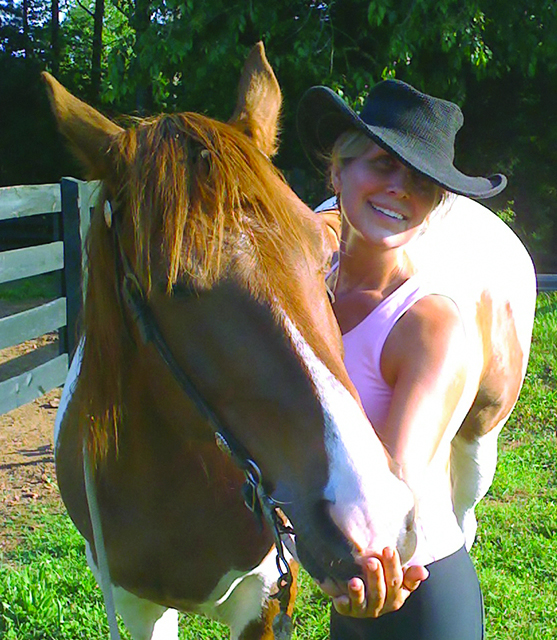
In the August 2017 issue of Auxiliary magazine, we interviewed American Legion Auxiliary member Melissa Hopson of Georgia about her volunteer work as an equine therapist as the focus of our “A Wise Woman Said” story. After the magazine was published, Melissa wrote us with the following message: “I am truly grateful for the opportunity to have shared some of my story with you, and ALA.” In June 2017, Melissa was diagnosed with Stage 4 colon cancer. And, sadly, in early 2018, her husband wrote us to say that Melissa had lost her battle with cancer. We feel Melissa’s words of hope and positivity still ring true and can help her fellow Auxiliary members through difficult times. Read on for an extended interview from our Wise Woman story.
Melissa Hopson, a certified equine therapist with PATH International (Professional Association of Therapeutic Horsemanship) and a member of American Legion Auxiliary Unit 45 in Canton, Ga., is the surviving widow of a helicopter pilot who was killed in action during Operation Desert Storm. One key message Melissa wants to share with other widows is that dark places are easy to find, but there is always light. There is always hope.
Why did you join the American Legion Auxiliary?
I actually saw the Auxiliary’s brochure for a carnival at a feed store. I picked it up and thought it was so interesting in regards to my background. I showed up to the carnival, and they said it would be open later. I said I was actually there to volunteer and told them I was part of a therapeutic horse-riding program. They said they could use help in the concession stand. So, I put on some gloves, went to the booth, and started putting hotdogs in buns. While there, I met some amazing people, and the stories we shared were so heartfelt. I felt like something as close-knit as the Auxiliary was a way to make a difference, but in a behind-the-scenes way. There are local people right here who make a difference.
Why did you decide to join PATH and become a riding instructor?
I was married to John Kendall Morgan, who was killed the last day of Desert Storm. His helicopter was shot down. We never had children. I later ended up marrying a man who I was a nanny for his three children. Being a stepparent, I had a lot of emotions, so I started volunteering with a program in my neighborhood. They wanted the equine skills I had studied in school. I realized the therapy wasn’t just for students because I benefitted so much from going and volunteering.
How can equine therapy benefit veterans and servicemembers?
I can hear a helicopter and visualize the tragedy. There’s something magical when you’re with a horse. There’s a bond. A helicopter could fly over, but the horse helps you to stay grounded. That’s why I wanted to get involved with Gold Star families. For that time they’re on the horse, they’re not thinking about who’s not at home — whether it’s a mom, dad, brother, sister. It transforms you; you’re in a different world when you’re with that horse.
Do you have advice for widows and widowers of servicemembers?
Truly believe in hope. When people say someone died doing what they wanted to do, believe in the hope and that the sacrifice they made was truly something in their honor that they chose to do for the rest of us. And believe that the sacrifice they made was so worth it. If we don’t live our life, that sacrifice is in vain.
How can American Legion Auxiliary members help servicemembers?
I’m all about doing things in a philanthropic way, but there should be more areas in which grieving people, like the widow I once was, could go. I love to do random acts of kindness — you know, just picking up a veteran’s tab and thanking them for their service — but also thanking them for coming home.
How can Auxiliary members help or get involved with PATH?
Create awareness. There are centers for PATH all around the world. I went to school with two people from Israel. Individuals can volunteer or just create awareness — even doing pony rides at the carnival with the Auxiliary.
How can we get younger generations involved with the ALA or assisting veterans?
Creating awareness. I was at the feed store and saw the Auxiliary’s pamphlet and realized there was a military connection. Where I used to work, we called it SMERF — social, military, educational, religious, and fraternal. Tapping into some of those areas is important and lets people know they’re out there and not just your grandmother who puts her flag out every Memorial Day. Around here, you don’t even see people in uniform, so it’s important to create that awareness and let people know the Auxiliary is there, and membership opportunities are there, and that you can hang out with others where there’s a common bond.
In the spirit of Service, Not Self, the mission of the American Legion Auxiliary is to support The American Legion and to honor the sacrifice of those who serve by enhancing the lives of our veterans, military, and their families, both at home and abroad. For God and Country, we advocate for veterans, educate our citizens, mentor youth, and promote patriotism, good citizenship, peace and security.